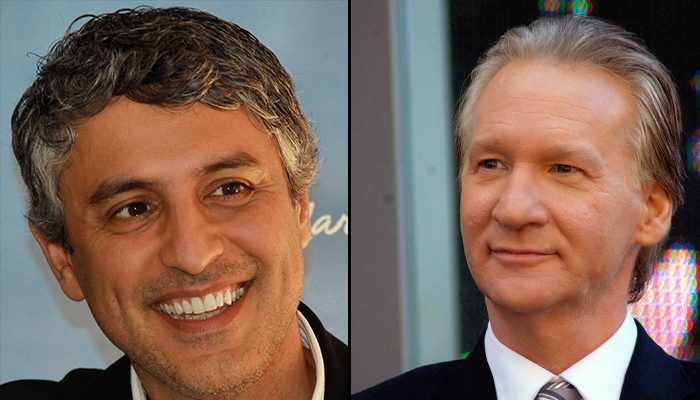
As usual, Bill Maher has upset Muslims with another monologue on the illiberality of their practices – as witnessed in various selective cases.
I have been a long time fan of Maher. As far as US political commentary goes, his weekly HBO show Real Time with Bill Maher is one of the sharpest, and one of the funniest, products of mainstream US media. I rarely miss it. He is also a brilliant stand up comedian. I also enjoy Reza Aslan’s writings on religion and his frequent appearances on US media – including sometimes on Maher’s show as a panelist.
In recent days both men once again blew open the debate over the portrayal of Islam in the US media. Of note, Aslan took Maher to task during an appearance on CNN, pointing out that several misconceptions that Maher voiced in his monologue above were essentially misguided bigotry that distorted an important debate.
Aslan makes excellent points. Primarily that Maher is a comedian, not an academic/expert on religion (as Aslan is) and should not be taken too seriously. However, Maher has also (when taken over the longer term rather than one monologue) made contributions worth preserving in this debate.
Aslan is absolutely correct that Islam is not violent per se, but that it is people who are violent. History is full of violent and terrible events attributable in whole or in part to all religions. Furthermore, across all religions violence is, sadly, not relegated to history. It may even be on the rise. However, Maher is also correct to point out that in the modern day one religion stands out from the others as more prone to political distortion and violence. To borrow words from Sesame Street, one is not like the others. We can see this in the barbarism of the ‘Islamic State’ (aka ISIS/ISIL) and the Taliban.
However – unlike Maher I do not think this problem is ‘Islam’. The problem is with how certain people have politicised Islam and misused it for wholly unacceptable, and often futile, aims. As Aslan points out, there are Islamic countries that are politically representative and offer relative equality to women such as Malaysia, Indonesia and Turkey. Though to use any of those countries as examples of good governance or progressive politics would be spurious. So Aslan might also try to veer away from using arguments that are equally as lacking in nuance as Maher’s.
This debate is not trivial. After all, a coalition of nations has just gone to war with the ‘Islamic State’. While it is not being painted overtly as one, there is effectively a military war on a religious army currently raging. Amidst this backdrop, moderation and nuance in the political debate must gain hegemony. That is where solutions must be drawn from. The American Constitution set the idea of the good life out best when it separated Church and State. Yet, even in today’s America, religion has its tentacles all over politics. Religion is back at the table and to the annoyance of liberals it never really went away.
The big foreign policy issues of the present and the near future will revolve around deeply divisive religious issues, fact. So, we should all learn from these debates and educate ourselves rather than settle lazily behind one talking head or tabloid columnist. Maher and Aslan’s face off is a good starting point, and I’m glad that I live in a state where opinions such as theirs can be heard equally.
Further Reading on E-International Relations
- Are Autistic People Truly at Greater Risk of Being Radicalised?
- A Seat at the Table Is Not Enough: The Failings of Brazil’s Renova Foundation
- Violence in the West African Sahel is not about Terrorism
- Violent Non-State Actors in the Middle East: Origins and Goals
- Opinion – Why Autonomy is Not a Viable Solution in Karabakh
- Transitional Justice in Tunisia: Any Role for Islam?